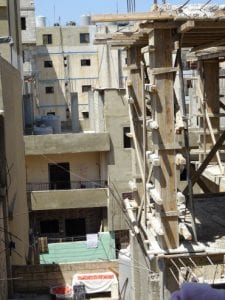Hospitality and hostility: the role of established refugees in a crisis
By Melissa Bradshaw, on 9 November 2016
Even in the most sympathetic coverage, refugees often come across as passive and dependent. Dr Elena Fiddian-Qasmiyeh’s Lunch Hour Lecture showed how refugees, in fact, actively help each other in highly challenging and complex situations. Her lecture focused on Baddawi, a refugee camp in North Lebanon.
Dr Fiddian-Qasmiyeh is leading a new four-year AHRC-ESRC funded research project, Local Community Experiences of and Responses to Displacement from Syria, that “aims to disrupt the assumption that citizens are hosts and aid providers while refugees are dependent recipients of aid”.
 This interdisciplinary and participatory research in nine communities in the Middle East will address the need for evidence that tells us how local communities respond to people displaced by conflict.
This interdisciplinary and participatory research in nine communities in the Middle East will address the need for evidence that tells us how local communities respond to people displaced by conflict.
Dr Fiddian-Qasmiyeh is also Co-Director of the Migration Research Unit, and Coordinator of UCL’s Refuge in a Moving World Research Network, which seeks to examine the effects of UCL’s institutional response to the refugee crisis and strengthen its impact.
She outlined three trends: ‘Protracted displacement’ describes displacement that has lasted for more than 26 years; ‘urban displacement’ applies to the 65% of refugees living in cities; ‘overlapping displacement’ between different refugee groups has until now not been thoroughly analysed.
Baddawi is a Palestinian refugee camp run by competing groups and militia – a place of both violence and sanctuary, said Dr Fiddian-Qasmiyeh. It was established in 1955.
In 2007, 15 thousand refugees moved to Baddawi from Nahr al-Bared, another refugee camp that had become the centre of fighting between the Lebanese army and Fatah al-Islam, a radical Sunni Islamist group.
 Close
Close


